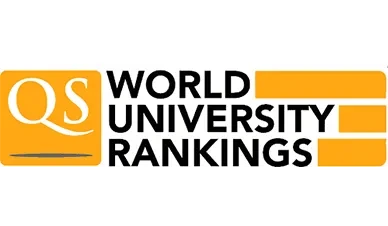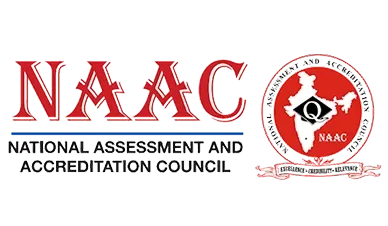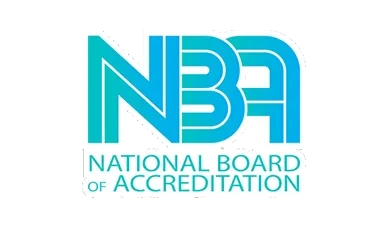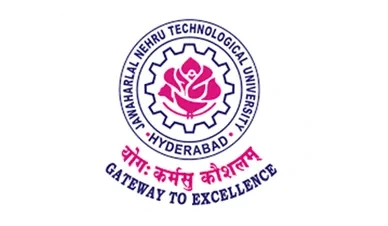Department Overview
The Department of Mechanical Engineering is a hub of innovation, research, and industry-driven learning, dedicated to shaping future-ready engineers capable of addressing global challenges. With a strong foundation in fundamental and advanced engineering principles, the department fosters technical proficiency, creativity, and problem-solving skills essential for developing cutting-edge technologies.Equipped with state-of-the-art laboratories in advanced manufacturing, thermodynamics, fluid mechanics, automation, and computational analysis, the department ensures a hands-on learning experience. A strong emphasis is placed on interdisciplinary education, with elective courses in emerging domains such as Industry 4.0, Robotics, Additive Manufacturing, and Sustainable Energy Systems. Students are encouraged to enhance their knowledge through NPTEL/MOOCs courses, which are an integral part of the academic curriculum.Our faculty comprises highly qualified professionals with extensive industrial, academic, and research experience. With a significant number holding postgraduate and doctoral degrees, faculty members actively contribute to knowledge creation through research publications, patents, and industry collaborations. They employ advanced pedagogical techniques, including simulation-based learning and computational tools, to make the learning process more effective and engaging.
To bridge the gap between academia and industry, the department maintains strong collaborations with leading industries. Students gain exposure through structured industrial training, internships, and industry-driven projects starting from the second year. Regular industrial visits, expert lectures, and technical workshops provide valuable insights into real-world applications. Placement assistance and entrepreneurship support ensure that students have the resources needed to achieve their professional aspirations. Beyond academics, the department actively promotes co-curricular and extracurricular engagement. Students participate in national and international competitions, skill development programs, and outreach initiatives under NSS, such as technological awareness drives, sustainability projects and blood donation camps. A structured mentoring system provides academic and career guidance, supplemented by professional counselling services for personal and psychological well-being. The department’s relentless pursuit of excellence has resulted in consistently increasing placement records, with graduates securing positions in top-tier industries and prestigious higher education institutions worldwide.
Highlights of the Department
Majority percentageof Placement Rate – Students secured positions in top companies with packages up to ₹7.5 LPA.
Top Recruiters Include: Talent Serve, Milekal Engineering, Dexterity Edtech, MLA Group of Companies, TATA Advanced Systems, Revolve engineering and Skyroot Aerospace.
Highly Qualified Faculty: Industry and academic seasoned professors who serve to ensure that students are ready for the practical world.
The department houses the TSI (Team Super Ignite), a dedicated research and innovation group specializing in the design and development of electric vehicles (EVs). The team actively participates in prestigious national and international competitions, consistently securing top accolades for their advancements in EV technology and sustainable mobility solutions.
State-of-the-Art Research Facilities: Highly sophisticated laboratories to facilitate research and development activities, creativity, and innovation.
Strong Industry Collaborations: An association with major industrial corporations to ensure direct practical and real-life experiences becomes a crucial factor in the final year of the study.
CoE(Centre of Excellence) are skill-focused institutes in the department such as Automotive, Additive Manufacturing, and Advanced Materials.
Industrial Visits & Expert Lectures: Often, while talking to the members of the profession or those who are considered experts, the learners get new information about different fields.
Vision
To be a leading department of Mechanical Engineeringin the region.
Mission
1. Nurture young individuals into knowledgeable, skillful and ethical professionals in their pursuit of Mechanical Engineering.
2. Nurture the faculty to expose them to world-class infrastructure.
3. Sustain high performance by excellence in teaching, research and innovations.
4. Extensive partnerships and collaborations with foreign universities for technology up gradation.
5. Develop Industry-Interaction for innovation and product development.
Program Educational Objectives (PEO)
The program educational objectives of the Mechanical Engineering Program are to produce graduates who will:
Fundamental technical knowledge and skills in mathematics, science, and engineering to recognize, analyze and solve problems, and to apply these abilities to the generation of new knowledge, ideas or products in industry or government; and to implement these solutions in practice.
Practical experience to work well in local and international team environments and to become effective written and oral communicators, both for communicating ideas to other people, mentoring, and for learning from others.
Recognition of the importance of and engagement in life-long learning, whether through self- study, continuing education courses or workshops, or through formal graduate level education, and encourage others to have this same motivation.
Understanding of ethical responsibility and service toward their peers, employers, and society and follow these precepts in their daily lives.
Successfully apply their knowledge in their careers as mechanical engineers.
Respect societal and ethical considerations of their profession.
Continue to learn, and pursue graduate studies if they so choose.
Work effectively in multi-disciplinary teams by providing technical expertise and effective communication.
PROGRAM OUTCOMES (POs)
The mechanical engineering program will give our graduating seniors the skills and knowledge base to allow them to achieve our program objectives after graduation. By the time of graduation, our students will have :
An ability to apply knowledge of mathematics, science and technology
An ability to design and conduct experiments, as well as to analyze and interpret data
An ability to design a system, component, or process to meet desired needs within realistic constraints such as economic, environmental, social, political ,ethical, health and safety, manufacturability and sustainability
An ability to function on multidisciplinary teams
An ability to identify, formulate and solve engineering problems
An understanding of professional and ethical responsibility
An ability to communicate effectively
The broad education necessary to understand the impact of engineering solutions in a global, economic, environmental, and societal context.
A recognition of the need for and an ability to engage in lifelong learning
Knowledge of contemporary issues
An ability to use the techniques, skills and modern engineering tools necessary for engineering practice
An ability to work in mechanical system areas
MAPPING OF THE PEOs WITH THE EXPECTED OUTCOMES
| Program Objectives | Program Outcomes | |||||||||||
|---|---|---|---|---|---|---|---|---|---|---|---|---|
| a | b | c | d | e | f | g | h | i | j | k | l | |
| I | √ | √ | X | √ | X | X | X | √ | X | √ | √ | √ |
| II | √ | √ | √ | √ | √ | √ | √ | √ | √ | X | √ | √ |
| III | X | X | X | √ | √ | X | √ | X | √ | √ | √ | √ |
| IV | X | X | √ | X | X | √ | √ | √ | X | √ | √ | X |
| V | √ | √ | √ | √ | √ | √ | √ | √ | √ | √ | √ | √ |
| VI | X | X | √ | X | X | X | √ | √ | X | X | √ | √ |
| VII | √ | √ | √ | √ | X | X | √ | √ | √ | X | √ | √ |
| VIII | X | √ | √ | √ | √ | X | √ | √ | X | X | √ | √ |
Program Specific Outcomes (PSO)
PSO1: Ability to solve contemporary issues related to manufacturing and industrial automation through internship integrated program curriculum that includes knowledge, practice and hands on training
PSO2: Able to analyze, design and develop/model mechanical and its allied systems using software tools such as AUTOCAD, ANSYS, Creo etc
Departmental Advisory Board
| S.No | Role | Name & Designation |
|---|---|---|
| 1 | Chairman, BOS | Dr.B.Vijaya Kumar Professor & HOD, Department of Mechanical Engineering, GNIT |
| 2 | JNTUH Nominee | Dr.AVSS Kumara Swamy Guptha Senior Professor, Department of Mechanical Engineering, JNTUH |
| 3 | Academic Council Nominee | Dr.L.Siva Rama Krishna Professor, Department of Mechanical Engineering, OU |
| 4 | Academic Council Nominee | Dr.G.Laxmaiah Professor, Department of Mechanical Engineering, CBIT |
| 5 | Members | Dr.S.Sreenatha Reddy Principal,GNIT |
| 6 | Industry Representative | Mr. K. Venu Gopal Reddy Director, Fluid Power Systems Pvt. Ltd, Hyderabad |
| 7 | Members | Mr . M. Sreedhar Assistant Professor Department of Mechanical Engineering,GNIT |
| 8 | Members | Mr.B. Phanindra Kumar Assistant Professor Department of Mechanical Engineering, GNIT |
| 9 | Members | Mrs. P. Vara Lakshmi Assistant Professor Department of Mechanical Engineering, GNIT |
| 10 | Members | Mr. M. Naveen GET,TATA Aerospace, Hyderabad |
Departmental Academic Committee
| SI. No. | Name | Designation | Role |
|---|---|---|---|
| 1 | Dr. B. Vijaya Kumar | Professor & Head | Chair Person |
| 2 | Dr. P. Venkaiah | Assistant Professor | Program Chair |
| 3 | Mr. B. Phanindra Kumar | Assistant Professor | Co-ordinator |
| 4 | Mr. A. Vijay Kumar | Assistant Professor | Module Co-ordinator |
| 5 | Mr. M. Sreedhar | Assistant Professor | Module Co-ordinator |
| 6 | Mrs. P. Vara Laxmi | Assistant Professor | Course Co-ordinator |
| 7 | Mr. N. Yadagiri | Assistant Professor | Course Co-ordinator |
| 8 | Mrs. K. Deepika | Assistant Professor | Course Co-ordinator |
U. G. Programme ( B.Tech)
B.Tech in Mechanical Engineering - 60
| Program Structure | |
|---|---|
| Program | B.Tech |
| Duration | 4 years |
| Eligibility Criteria | 10+2 Science stream (Physics & Mathematics) |
| Selection Procedure | Entrance Test and Interview |
Areas of Specialization
The discipline requires a sound understanding of the core concepts such as Mechanics, Kinematics, Thermodynamics, Fluid mechanics, Material Science and Energy.
Academics
Research Mileage: Students have multiple opportunities in pursuing research in more than a dozen thrust areas. Some of the specific areas include Computer-Aided Design and Manufacturing, Rapid Prototyping, Robotics and Controls, Turbo machinery and combustion system, IC Engines, Multi-Phase flow, Nano mechanics, Tribology, Computational Fluid Dynamics and Acoustics.
Career Prospects
Mechanical Engineering students can find large number of opportunities in building a long term rewarding career. Ample jobs are available for Mechanical Engineers both in private and public sector. The candidates can find placements in various manufacturing and production firms such as Automobile, Aerospace, Chemical, Communication, Computer, Steel, Power generation industries. The candidates can also look out for teaching positions in various education institutions and can work as consultants in automobile, logistics, and transportation firms.
The Mechanical Engineering can also find jobs in merchant navy, and the three wings of Armed forces. With the growing automation, Computer Aided Design (CAD) and Computer Aided Manufacturing (CAM) have opened up lucrative job position in software engineering for Mechanical Engineers.
HOD Message
Mechanical Engineering plays a crucial role in shaping the modern world by driving technological advancement and innovation, bridging the gap between scientific theories and practical solutions.
Mechanical engineers are responsible for designing, developing, and refining systems and machinery that are fundamental to industries worldwide, including automotive, aerospace, energy, and manufacturing. As global challenges continue to grow, the importance of Mechanical Engineering has never been greater. Our field is at the forefront of innovation, from advancing sustainable energy technologies and reducing environmental impact to enhancing automation and artificial intelligence. The knowledge and expertise our students gain prepare them to tackle humanity's most pressing challenges and developing technologies that improve quality of life while ensuring the sustainability of our planet for future generations.
As we continue to grow and evolve as a department, we remain committed to collaborating with industry experts, researchers, and international partners to ensure our education and research efforts lead to practical, real-world solutions. We envision a future where Mechanical Engineering not only drives efficiency and effectiveness but also promotes industries that are responsible, sustainable, and beneficial to society.
Dr. B. Vijaya Kumar
Professor & HOD
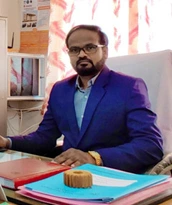
HOD Profile
Dr. B. Vijaya Kumar earned his Bachelor's degree in Mechanical Engineering from Acharya Nagarjuna University in 1996, followed by a Master's degree in Mechanical Engineering with a specialization in Production Engineering from JNTU Hyderabad in 2002. He later obtained his Doctorate in Mechanical Engineering from JNTU Hyderabad in August 2016. Currently, he serves as a Professor and has been the Head of the Department of Mechanical Engineering since June 2, 2014, while also holding the position of Controller of Examinations at Guru Nanak Institute of Technology since October 1, 2022.
With a teaching career spanning 23 years, he also possesses five years of valuable industry experience in manufacturing and processing. As an active researcher in Welding Technology, he has led multiple R&D consultancy projects. He has been instrumental in securing national-level awards for students of Team Super Ignite in GO-KART competitions and played a key role in establishing the Centre of Excellence for Automotive. This center facilitates projects focused on the development of Go-karts, Quad Bikes, Formula Vehicles, and e-Vehicles.
He has supervised 50 B.Tech projects and 17 M.Tech projects and is currently guiding two Ph.D. scholars from NIT Warangal. He is a lifetime member of the Indian Institute of Welding (IIW), Indian Society for Technical Education (ISTE), and American Society of Mechanical Engineers (ASME). He has also received the Best Paper Award from NIT Warangal.
In his role as Controller of Examinations, he oversees all aspects of exam administration, including preparation, scheduling, evaluation, and result processing. He ensures adherence to schedules, maintains confidentiality, supervises examination-related activities, and manages records. Additionally, he oversees financial transactions, convenes meetings, and safeguards examination documents.
Awards:
- Outstanding Achievement and Excellence Award: Acknowledged for dedicated contributions to society and the nation, conferred by the Global Book of Excellence Records in 2024.
- Excellence in Public Service Examination Administration: Recognized by TGPSC in 2024 for successfully managing the conduction of Group-I and Group-III Public Service Examinations as Chief Superintendent.
Patents: He has filled two patents in National and one in International
- Harvinder Singh Saini, Bongarala Vijaya Kumar, “Split Exhaust System With Single and Multiple Suction Fans for Flue Gases in the Kitchen Chimney” Numbered as PCT/IN2018/050523
- Harvinder Singh Saini, Bongarala Vijaya Kumar, “Split Exhaust System With Single and Multiple Suction Fans for Flue Gases in the Kitchen Chimney”, App. No. 201841022587 A, 2018.
- Harvinder Singh Saini, Bongarala Vijaya Kumar, “An Exhaust arrangement for Accelerated and Accentuated Draught and Expulsion of Gases and Vapours Using Chimney of Varying Cross Section”, App. No. 201841006120 A, 2018.
Book Chapter: 01
- Dr. B. Vijaya Kumar, B. Sridhar Babu “Optimization of Process Parameters for AA6063 Alloy Friction Surfacing on Mild Steel” Published in Materials Forming, Machining and Tribology book series 2021. Print ISBN978-3-030-62162-9 Online ISBN978-3-030-62163-6. DOI: https://doi.org/10.1007/978-3-030-62163-6_8
Publications:
Published in SCI Indexed: 04
Published in Scopus Indexed: 05
Published in UGC International Journals: 38
Published in Conferences: 05

Dr. B. Vijaya Kumar
M.Tech, Ph.D, LMISTE, LMIIW
Professor, HOD-ME & Controller of Examinations
Ph: 7729993249, 8096609836
Email: ceo.gnit@gniindia.org , hodme.gnit@gniindia.org
Faculty Profiles
| S.NO | NAME OF THE FACULTY | QUALIFICATION | DESIGNATION |
|---|---|---|---|
| 1 | Dr. B.VIJAYA KUMAR | Ph. D | Professor, HOD& COE |
| 2 | Mr. M. Sreedhar | M. Tech (Ph.D) | Assistant Professor |
| 3 | Dr. P.Venkaiah | Ph.D | Assistant Professor |
| 4 | Mr. A. VIJAY KUMAR | M. Tech (Ph.D) | Assistant Professor |
| 5 | Mrs. VARALAXMI | M. Tech (Ph.D) | Assistant Professor |
| 6 | Mr. B. Chandra Shekar | M. Tech | Assistant Professor |
| 7 | Mr. B. Phanindra Kumar | M. Tech (Ph.D) | Assistant Professor |
| 8 | Mr. K. Dayakar | M. Tech | Assistant Professor |
| 9 | Mr. N. Yadagiri | M. Tech | Assistant Professor |
| 10 | Mr. T. Jaya Sriram | M. Tech (Ph.D) | Assistant Professor |
| 11 | Mr.Y. Srinivasa Reddy | M. Tech | Assistant Professor |
| 12 | Mrs. K. Deepika | M. Tech | Assistant Professor |
| 13 | Mr. P. Ravi Kiran | M. Tech | Assistant Professor |
| 14 | Mrs. K. Anoosha | M. Tech | Assistant Professor |
| 15 | Mr. A. Vijay Kumar | M. Tech | Assistant Professor |
| 16 | Mr. Peram Kondala Rao | M. Tech (Ph.D) | Assistant Professor |
| 17 | Mrs. Bolla Charitha | M. Tech | Assistant Professor |
| 18 | Mrs. Chintakindi Narmada | M. Tech (Ph.D) | Assistant Professor |
He obtained his bachelor's degree in Mechanical Engineering from Acharya Nagarjuna University in 1996, followed by a Master's degree in Mechanical Engineering with Production Engineering specialization from JNTU Hyderabad in 2002. Subsequently, he completed his doctorate in Mechanical Engineering from JNTU Hyderabad in August 2016. Currently, he holds the position of Professor, and Head of the Department of Mechanical Engineering since 02.06.2014 and Controller of Examinations for Guru Nanak Institute of Technology since 01.10.2022 with a teaching career spanning 23 years; he has also accrued 5 years of valuable experience in the manufacturing and processing industries. He is an active researcher in the field of Welding Technology, he has undertaken numerous R&D consultancy projects, and he plays a pivotal role in the success of all the National Level Awards achieved by students of Team Super Ignite in the GO-KART Competition, he is the driving force behind the establishment of the Centre of Excellence for Automotives, where projects involving the development of Go-karts, Quad Bikes, Formula Vehicles, and e-Vehicles are undertaken.In addition to, he oversees all aspects of exam administration, including preparation, scheduling, evaluation, and result processing as head of controller of examinations (COE). He ensures adherence to schedules, maintains confidentiality, and supervises examination-related spaces and records. Additionally, he manages payments, convenes meetings, and secures examination documents.
Awards:
1. Award for Outstanding Achievement and Excellence: Recognized for selfless contributions to society and the nation, presented by the Global Book of Excellence Records in 2024.
2. Award for Excellence in Conducting Public Service Examinations: Honored by TGPSC for successfully overseeing the conduction of Group-I and Group-III Public Service Examinations as Chief Superintendent in 2024.
Patents: He has filled two patents in National and one in International
1. Harvinder Singh Saini, Bongarala Vijaya Kumar, “Split Exhaust System With Single and Multiple Suction Fans for Flue Gases in the Kitchen Chimney” Numbered as PCT/IN2018/050523
2. Harvinder Singh Saini, Bongarala Vijaya Kumar, “Split Exhaust System With Single and Multiple Suction Fans for Flue Gases in the Kitchen Chimney”, App. No. 201841022587 A, 2018.
3. Harvinder Singh Saini, Bongarala Vijaya Kumar, “An Exhaust arrangement for Accelerated and Accentuated Draught and Expulsion of Gases and Vapours Using Chimney of Varying Cross Section”, App. No. 201841006120 A, 2018.
Book Chapter: 01
1. Dr. B. Vijaya Kumar, B. Sridhar Babu “Optimization of Process Parameters for AA6063 Alloy Friction Surfacing on Mild Steel” Published in Materials Forming, Machining and Tribology book series 2021. Print ISBN978-3-030-62162-9 Online ISBN978-3-030-62163-6. DOI: https://doi.org/10.1007/978-3-030-62163-6_8 .
Publications:
Published in SCI Indexed: 04
Published in Scopus Indexed: 05
Published in UGC International Journals: 38
Published in Conferences: 05
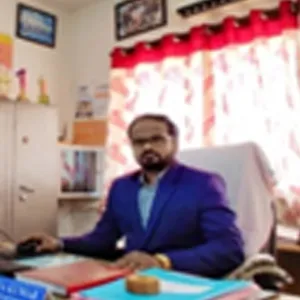
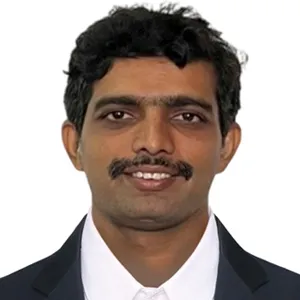
Mr. M. Sreedhar is an experienced academician and researcher with 16+ years of professional experience, including 15 years in teaching and 1.5 years in the industry. He is an Assistant Professor in Mechanical Engineering at Guru Nanak Institute of Technology, Hyderabad and is pursuing a Ph.D. in Robotics at KL Deemed to be University, focusing on bionic hands using Shape Memory Alloys and Metamaterials.
He holds an M.Tech. (CAD/CAM) from VIT University and a B.E. in Mechanical Engineering from Anna University. His research interests include robotics, automation, CAD search engines, MPD thrusters, hydrogen fuel cells, and bio-inspired engineering. He has published extensively in Scopus-indexed journals and has reviewed for Pearson Education’s GATE Mechanical Engineering guide.
His technical expertise spans Python, MATLAB, Creo Parametric, Autodesk Fusion, ANSYS, and computational modeling. He holds certifications in Machine Learning, AI, TensorFlow, and AWS ML services.
Dr. P. Venkaiah is an Assistant Professor at Guru Nanak Institute of Technology, Hyderabad, with a Ph.D. in Mechanical Engineering from NIT Meghalaya. His research focuses on thermal engineering, fluid power control, and renewable energy, particularly wind and solar energy. He has published in reputed journals such as Renewable Energy, Journal of Systems and Control Engineering, and IEEE Transactions on Industry Applications.He has a 96% GATE percentile, with scores of 470 (2014) and 602 (2015). He also received a merit scholarship and earned prizes in national events. You can explore his work further via his Google Scholar and Orcid profiles. Further information can be found through the links below:
• https://scholar.google.com/citations?user=WFkADfkAAAAJ&hl=en
• https://orcid.org/0000-0003-2877-9266
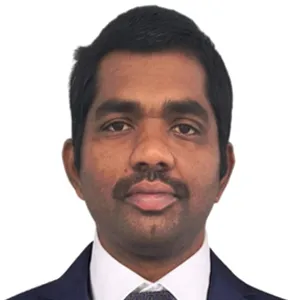
Mr. A. Vijay Kumar is a young and dynamic academic with a solid foundation in Engineering. Currently serving as an Assistant Professor in the Department of Humanities and Sciences at Guru Nanak Institute of Technology (GNIT), Hyderabad, Telangana, he brings over 13 years of teaching experience to his role.
Mr. Vijay Kumar is deeply committed to education and research, consistently striving to enhance his knowledge and skills. His research contributions have been published in prestigious international journals, including UGC Care-listed journals.
His primary research interests lie in the characterization of biomaterials in additive manufacturing and optimization techniques. His work focuses on addressing practical challenges in Engineering Materials, aiming to bridge the gap between theoretical advancements and real-world applications.
Mrs. P. Varalakshmi is an Assistant Professor in the Department of Mechanical Engineering at Guru Nanak Institute of Technology, where she has been contributing to academics and research since July 13, 2017. With a professional journey that began on July 02, 2012, she has gained extensive experience in Industry, teaching, research, and skill development. She holds M. Tech in Advanced Manufacturing Systems from Christu Jyothi Institute of Technology (2016) and a B. Tech in Mechanical Engineering from Narasaraopet Engineering College (2010). Currently, she is pursuing Ph.D. at KLU Vijayawada, focusing on Microstructure and Mechanical analysis of Friction Stirr Welded Joints.
An active researcher, Mrs. P. Varalakshmi has published 1 Patent, 1 SCI, 25 research papers in UGC CARE-listed journals, contributing significantly to the fields of Welding Technology.
In addition to her academic and research contributions, she plays a role in student skill development as a GURU for the AICTE IDEA Lab and as a trainer for PMKEY, fostering innovation and hands-on technical expertise among students. She is a Member of ISTE (ID: LM95081).

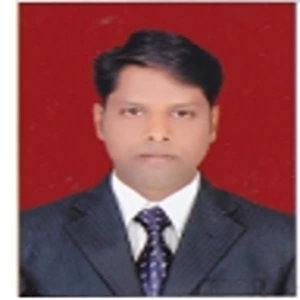
Mr. B.CHANDRA SEKHAR is working as an Assistant professor in the Department of Mechanical Engineering at Guru Nanak Institute of Technology, Hyderabad. He completed his B. Tech. ME from VMRF UNIVERSITY SELAM 2007, and his M.Tech. Machine Design from Vathsalya Institute of science and affiliated to JNTUH in 2014. He has 10 years of teaching experience. He has published four papers.
Mr. B. Phanindra Kumar is an Assistant Professor in the Department of Mechanical Engineering at Guru Nanak Institute of Technology, where he has been contributing to academics and research since July 21, 2017. With a professional journey that began on December 24, 2014, he has gained extensive experience in teaching, research, and skill development. He holds an M.E. in Thermal Engineering from Chaitanya Bharati Institute of Technology (2014) and a B.Tech in Mechanical Engineering from GRIET (2012). Currently, he is pursuing a Ph.D. at NIT Warangal, focusing on Micro Combustor Analysis using ANSYS Fluent, with research interests in Internal Combustion Engines, Hybrid Fuel Cells, and Micro Combustor Design.
An active researcher, Mr. Phanindra Kumar has published 22 research papers in UGC CARE-listed journals, contributing significantly to the fields of combustion efficiency and energy systems. Beyond research, he is also engaged in product development, specifically working on the design and development of a Commercial Dishwashing Machine.
In addition to his academic and research contributions, he plays a role in student skill development as the Faculty Co-Coordinator for the AICTE IDEA Lab, fostering innovation and hands-on technical expertise among students. He is a Member of ISTE (ID: LM98713).
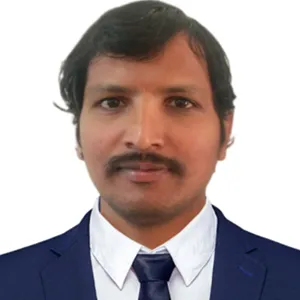
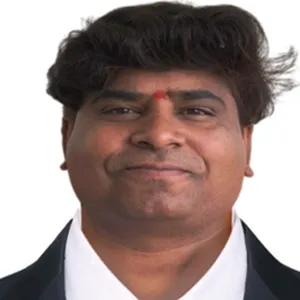
Mr. K.Dayakar is working as Assistant Professor of the Department of Mechanical Engineering at Guru Nanak Institute of Technology, Hyderabad. He completed his B. Tech, Mechanical Engineering from BIET, in 2008, ME CAD/CAM from CBIT in 2014. He has 10 years of teaching experience. He has published 8 international journals. His research interest areas are Design and simulation.
Young and vivacious
Mr. N. Yadagiri is an Assistant Professor in the Department of Mechanical Engineering at Guru Nanak Institute of Technology, where he has been contributing to academics and research since August 07, 2017. With a professional journey that began on may, 1, 2015, he has gained extensive experience in teaching, research, and skill development. He holds an M.Tech. in Production Engineering from Holy mary Institute of Technology (2014) and a B.Tech in Mechanical Engineering from MITS (2012). with research interests in Composite Materials, Ceramics.
An active researcher, Mr. Yadagiri has published 20 research papers in UGC CARE-listed journals, contributing significantly to the fields of Welding Techniques & Mechanical Testing. Beyond research, he is also engaged in product development, specifically working on the design and development of a Utility Vehicle.
In addition to his academic and research contributions, he plays a role in student Mentoring System as the Class Incharge.
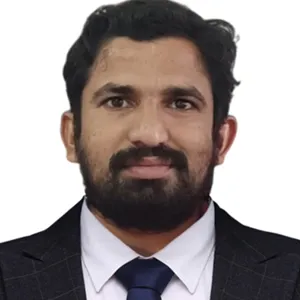
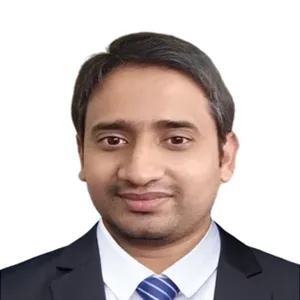
Mr.T. Jaya Sriram is an Assistant Professorin the Department of Mechanical Engineering at Guru Nanak Institute of Technology (GNIT), Hyderabad, with expertise in Advanced Manufacturing Engineering. He is currently pursuing a Ph.D. in Advanced Manufacturing Engineering at NIT Warangal ,completed his M.Tech in CAD/CAM from JNTU Kakinadaand has completed his B.TECH from Velagapudi Ramakrishna Siddhartha Engineering College(Autonomous) Vijayawada.
With over 8 years of teaching experience, he has guided students in mechanical engineering subjects, focusing on CAD/CAM and manufacturing processes. He has served in key academic roles, including Assistant controller in the Examination Branch, overseeing examination processes.
His research interests lie in advanced manufacturing techniques, thermal and structural analysis, and design optimization. He has also worked as a Project Apprentice at DLRL (Defense Electronics Research Laboratory), contributing to research on heat sink designs using CAE tools.
He has participated in several workshops and FDPs, including an AICTE-sponsored Faculty Development Programme on Rapid Casting Techniques. His technical skills include proficiency in AutoCAD, CATIA, ANSYS, and CNC programming.
Mr. Y. Srinivas Reddy is an Assistant Professor in the Department of Mechanical Engineering at Guru Nanak Institute of Technology, where he has been contributing since January 2, 2017. He completed his B.Tech from Narasaraopeta Engineering College in 2009 and his M.Tech in 2017 from a JNTUH-affiliated institute. With a strong background in Design and Automation, Mr. Reddy has handled Engineering Graphics approximately 15 times, consistently achieving excellent results. He has also made contributions to academic research, having published 3 UGC papers in the areas of Design and Automation. His expertise and dedication to teaching and research make him an integral part of the academic community at Guru Nanak Institute of Technology.

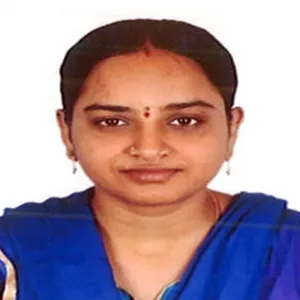
Mrs. K. Deepika Assistant Professor, Department of Mechanical Engineering Guru Nanak Institute of Technology, working since March 2021, and has been actively contributing to the Department's academic and research endeavors. She holds a B.Tech in Mechanical Engineering (2013) from CVSR College of Engineering, Hyderabad, and an M.Tech in Thermal Engineering (2017) from Siddhartha Institute of Engineering and Technology, Hyderabad, both with Distinction. With seven years of Teaching experience and one year of Industry experience, she has a strong academic and research background. She has published 20 papers in international journals.
Mr. P. Ravikiran serves as an Assistant Professor in the Department of Mechanical Engineering at Guru Nanak Institute of Technology, where he has been an integral part of the academic community since March 15, 2022. His professional career began on January 2, 2018, and he has since accumulated substantial experience in teaching and skill development. Mr. Ravikiran holds an M.Tech. in Design Engineering from Kakatiya Institute of Technology (2017) and a B.Tech. in Mechanical Engineering from Apex Engineering College (2013). He has also published eight research papers in UGC CARE-listed journals. In addition to his academic responsibilities, he also serves as the Assistant Controller of Examinations in the Examination Branch.
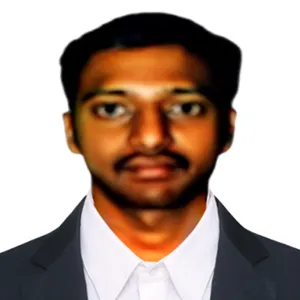
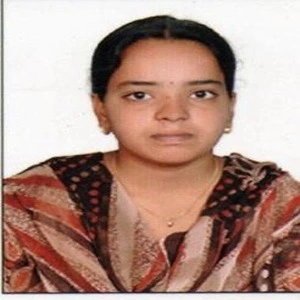
Mrs. KANDUKURI ANOOSHA is working as Assistant Professor in Mechanical Engineering Department at Guru Nanak Institute of Technology, Hyderabad. She completed her B.Tech Mechanical Engineering with distinction from Anurag Engineering College, Kodad in 2014, M.TECH Machine Design from Anurag Engineering College, Kodad in 2016, she has 7 years of teaching experience. She has published 10 journals.
Mr. Ambati Vijay Kumar is an Assistant Professor in the Department of Mechanical Engineering at Guru Nanak Institute of Technology, Hyderabad. He completed his M.Tech in Machine Design with Distinction in 2016 from a JNTUH-affiliated college and was ratified by JNTUH in 2017.
With five years of teaching experience, he has actively contributed to academic and research development. He has participated in five Faculty Development Programs (FDPs) and attended two conferences. His research interests include Machine Design, CAD/CAM, IoT in Smart Cities, Artificial Intelligence, and interdisciplinary studies.
Mr. Vijay Kumar is committed to fostering technical education, mentoring students, and promoting research and innovation in emerging technologies.
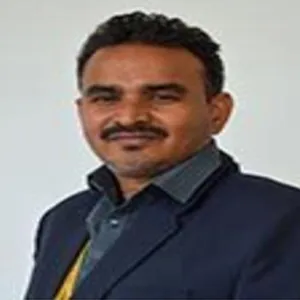
Mr. Peram Kondala Rao is currently working as an Assistant Professor in the Department of Mechanical Engineering at Guru Nanak Institute of Technology, Hyderabad. He holds an M.Tech in Machine Design from JNTU Kakinada and is pursuing a Ph.D. from the same university. With over 18 years of teaching and industry experience, he has served in various reputed engineering institutions and also worked as a Design Engineer in Jaya Hydraulics Pvt. Ltd., Chennai. His areas of expertise include Machine Design, Solid Mechanics, Computer-Aided Engineering Graphics, Kinematics of machinery ,Dynamics of Machinery and Fluid Mechanics. He has published several research papers in reputed international journals and conferences and authored a textbook titled Production Engineering (ISBN: 9789395331876). In addition to teaching, he has actively contributed to academic administration, ISO and NBA accreditation processes, and JNTU inspections. His strengths lie in teamwork, time management, and continuous learning.
Mrs. Bolla Charitha is working as an Assistant Professor in the Department of Mechanical Engineering at Guru Nanak Institute of Technology, Hyderabad. She holds an M.Tech in Machine Design from JNTUH. With over 8 years of teaching experience, she has served in various reputed engineering institutions with significant contributions to both teaching and institutional development. Her areas of expertise include Engineering Materials, Machine Design, Manufacturing Process, Machine Tools, Computer-Aided Engineering Graphics, and Fluid Mechanics. She has published several research papers in reputed international journals (ISSN NO: 2395-1052). In addition to teaching, she has actively contributed to academic administration, NAAC, ISO and NBA accreditation processes, and JNTU inspections. Her strengths like in teamwork, time management, and continuous learning.
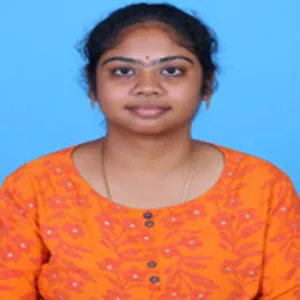
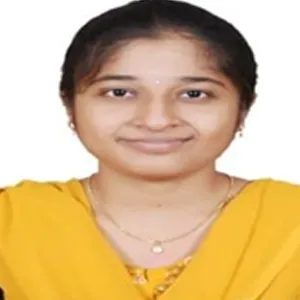
Mrs. Chintakindi Narmada is working as an Assistant Professor in the Department of Mechanical Engineering at Guru Nanak Institute of Technology, Hyderabad. She holds an M.Tech in CAD/CAM from JNTUH and she is pursuing a Ph.D. from the kalasalingam university in Tamilnadu. With over 10 years of teaching experience, she has served in various reputed engineering institutions. Her areas of expertise include CAD/CAM, Engineering Materials, Machine Design, Manufacturing Process, Machine Tools, Computer-Aided Engineering Graphics, Finite Element Methods, and Fluid Mechanics. She has published several research papers in reputed international journals (ISSN NO: 2236-6124). In addition to teaching, she has actively contributed to academic administration, NAAC, ISO and NBA accreditation processes, and JNTU inspections. Her strengths like in teamwork, time management, and continuous learning.
Laboratories
The department is well equipped with state-of-art laboratories and infrastructural facilities. The Mechanical Engineers use the key principles as well as other stock of knowledge to design and analyze manufacturing plants, industrial equipment’s, and machinery, heating and cooling systems, motor vehicles, aircrafts, water crafts, robotics and medical devices.
State-of-Art Laboratories Are Classified As Under:
- Engineering Work shop
- Mechanics of Solids & Metallurgy Lab
- Production Technology Lab
- Machine Drawing Lab
- Fluid Mechanics and Fluid Machinery Lab
- Thermodynamics Lab
- Instrumentation & Control System Lab
- KOM & DOM Lab
- Machine Tools & Metrology Lab
- Thermal Engineering. Lab
- Heat and Mass Transfer Lab
- Computer Aided Design and Manufacturing lab
- Simulation & Additive Manufacturing Lab
Engineering Work shop
Engineering Workshop is to provide theoretical and practical knowledge of manufacturing environment to all the engineering students. It gives the basic working knowledge required for the production of various engineering products. It explains the construction, function, use and application of different working tools, equipment, machines as well as the technique of manufacturing a product from its raw material.
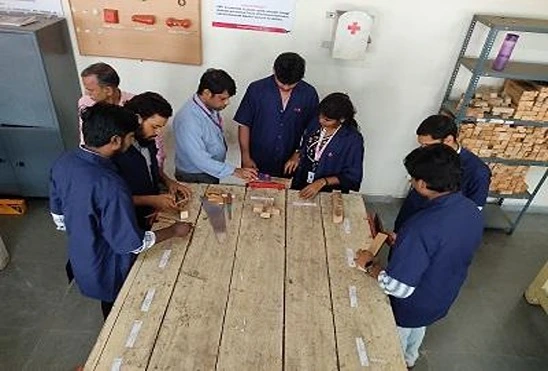
MECHANICS OF SOLID LAB
As a part of II B.Tech – 1 Semester curriculum in Metallurgy and MOS, our institution has established two independent well equipped laboratories on Metallurgy practice and Mechanical T laboratories. These labs provide all the basic requirements and impart the necessary practical training to the students of second year Mechanical Engineering stream.
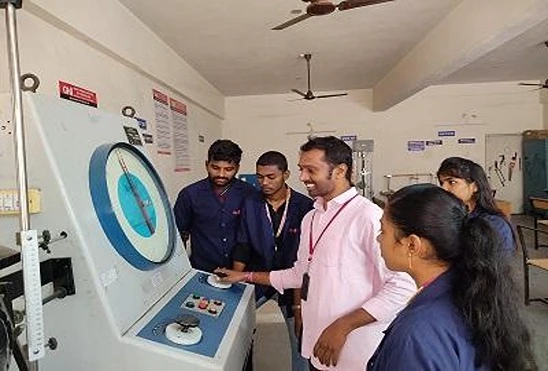
METALLURGY LAB
As a part of II B.Tech–1 Semester curriculum in Metallurgy lab. This lab provides wide scope to study the micro structural studies of the some important metallic materials based on their phase diagrams of some important metal systems (Fe-C, Cu-Zn, Al-Cu), Hardness measurement, Hardenability of steels using Jominey’s End-Quench test etc.

PRODUCTION TECHNOLOGY LAB
As a part of II B.Tech – 2 Semester curriculum in Production technology lab. This lab provides wide scope to study the different welding techniques such as oxy-acetylene welding, spot welding, TIG welding, & arc welding. Plastic Moulding techniques such as blow moulding, injection moulding & sand casting, permeability test, universal strength machine applications & pattern making machine like wood turning lathe are provided.
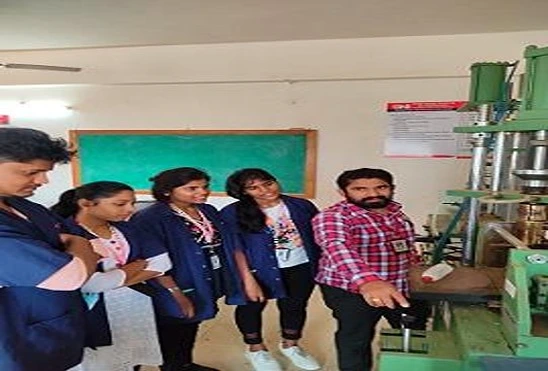
MACHINE DRAWING LAB
As a part of II B.Tech – 2 Semester curriculum in Machine drawing lab, this lab is well equipped with the lab was arranged to accommodate individual workstations for each student. Each workstation is equipped with a drawing board, T-square, set squares, compasses, dividers,scales, erasers, and other traditional drafting tools. There also be dedicated areas for group work and discussions.

MECHANICS OF FLUIDS & HYDRAULIC MACHINES LAB
As a part of II B.Tech – 2 Semester curriculum in MFHM lab, this lab is well equipped with experiments on different turbines like PELTON, FRANCIS , losses in pipe friction, application of Bernoulli apparatus, venturimeter, orificemeter, Force exerted on different types of vanes, different types of pumps such as reciprocating & centrifugal pumps
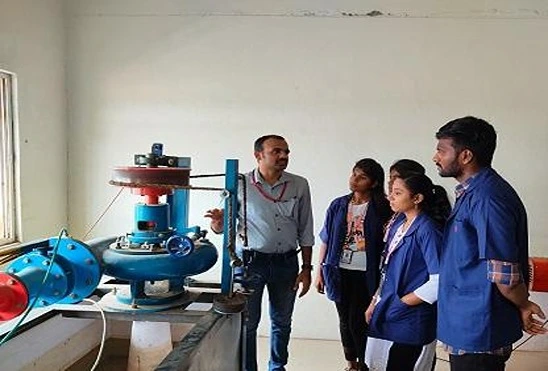

INSTRUMENTATION LAB
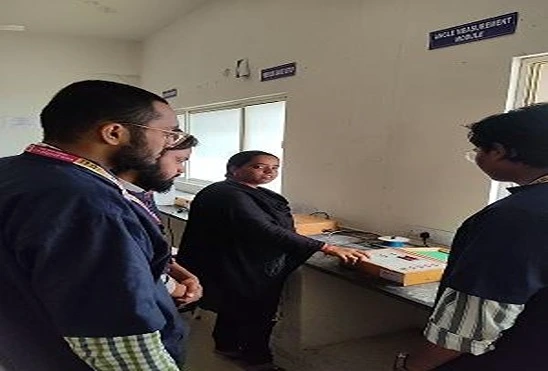
MACHINE TOOLS LAB
As a part of III B.Tech – 1 Semester curriculum this laboratory is conducted for the students of mechanical Engineering. This lab is well equipped with Lathe Machine, Milling Machine, Drilling, Shaping, Grinding, Slotting, Radial, Surface Grinding, Tooling end grinding for manufacturing. Here the main intention is to focus on the basic working of machines and working into their application in industries.
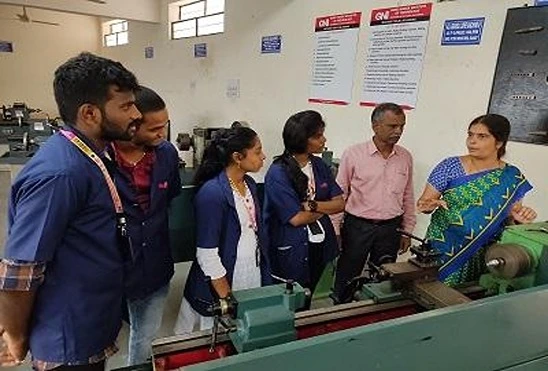
METROLOGY LAB
As a part of III B.Tech – 1 Semester curriculum this laboratory is conducted for the students of mechanical Engineering. This lab is well equipped with Micro meter, Venire Calipers, Sine bar, Venire Height Gauge, Bevel Protector, Spirit Level, Internal Micrometer, Dial Bore Gauge for manufacturing. Here the main intention is to focus on the basic working of machines and working into their application in industries.

THERMAL ENGINEERING LAB
As a part of III B.Tech – I Semester curriculum this Laboratory is conducted for the students of Mechanical Engineering. This lab is well equipped with Four Stroke Single cylinder Engine, Four Stroke Twin Cylinder Engine, Four Stroke Four Cylinder inline Engine, Refrigeration Test Rig and Air conditioning Test Rig, Multistage Reciprocating Air Compressor, Boiler Cut Models and Valve Timing Diagram Model. Here the main intention is to focus on the basic working of Engines and Performance Evaluation.

HEAT TRANSFER LAB
As a part of III B.Tech – II Semester curriculum this Laboratory is conducted for the students of Mechanical Engineering. This lab is well equipped with Metal bar Apparatus, Composite Wall Apparatus, Emissivity Apparatus, Natural Convection Apparatus, Forced Convection Apparatus, Pin Fin Apparatus, and Stefan Boltzmann’s Apparatus, Heat Exchanger Apparatus. This lab is also open and provides the necessary help and infrastructure to students for conducting heat transfer analysis during the course of carrying out their Mini projects.

COMPUTER AIDED DESIGN AND MANUFACTURING LAB
As a part of IV B.Tech – 1 Semester curriculum this laboratory is conducted for the students of mechanical Engineering. This lab is well equipped with Computers with power Regular, Internet Facility. Here the main intention is to focus on the basic Drawing, Part Modeling using Autocad, CATIA V5 software. This laboratory also helps the students in doing their Mini and Major Projects.
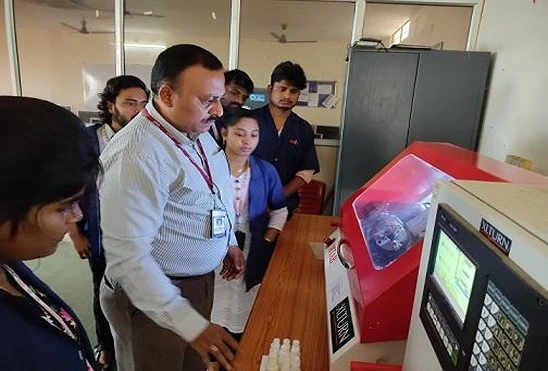
SIMULATION & ADDITIVE MANUFACTURING LAB
The additive Manufacturing Laboratory is to provide the students with an active learning environment for fabricating three dimensional (3D) models directly from the computer aided design (CAD) data. Students use the laboratory to model and fabricate metal/polymer complex shaped objected that are used in the engineering and medical applications.
Modeling and converting CAD models into STL files, Simulation of process parameters using Catalyst software, Fabrication of CAD models using Fused Deposition Modeling (FDM) machine using polymers, Converting CT/MRI scan data using MIMICS Software to fabricate the Bio-models. Post processing equipment for support removal and surface finishing.

Value Added Programs
Department of Mechanical Engineering has added several value added programs for the students so that they get high end training and exposure as a part of their curriculum.
CAD / CAM Training
- Diploma in CAD PRO ( AUTOCAD, PRO-E, CATIA, ANSYS, HYPERMESH )
- Advanced Diploma in CAD PRO ( AUTOCAD, PRO-E, CATIA, ANSYS, HYPERMESH, UG NX, CFD )
- Diploma in HYPERMESH ( HYPERMESH )
- Diploma in CAD AERO PRO ( AUTOCAD, PRO-E, CATIA, ANSYS, CFD )
- Advanced Diploma in AERO CAD PRO ( AUTOCAD, PRO-E, CATIA, ANSYS, HYPERMESH, UG NX, CFD )
PRO-E - This is a 3D Modelling Tool used extensively for solid modelling.
CATIA - This is a 3D Modelling Tool used exclusively for surface modelling
ANSYS - This is an analysis tool used to analyze a component for any given constraints and loads and to validate the product.
CFD - This is an analysis tool used to check flow patterns of a given fluid for any given boundary conditions.
UG NX - 3D Modeling Tool used to create g-codes & m- codes for machining any product in a cnc m/c, also used for creating moulds and also core & cavity.
HYPERMESH - This is a monopolic tool used for meshing and to improve quality of mesh.
A Certificate Course In Design Of
- (A) Process Equipment
- (B) Rotating Equipment
A Certificate Course In Calibration Of Measuring Devices, Through Sae India Gnit Collegiate Club, Students Can Seaign And Fabricate, Different Automotive Vehicles Of Their Desire.
Roll of Honour
| SI. No | Academic Year | Roll Number | Name of the Student | % / CGPA |
|---|---|---|---|---|
| 1 | 2019-2023 | 19831A0349 | Nallan Chakravarthula Nitin | 7.86 |
| 2 | 2020-2024 | 21835A0308 | B.Saisrinivas | 9.09 |
| 3 | 2018-22 | 19835A0309 | KHALEEL UR RAHMAN | 8.28 |
| 4 | 2017-21 | 18835A0331 | SAMALA KALYAN | 8.09 |
| 5 | 2016-20 | 16831A0301 | A B S KEERTHANA | 8.62 |
| 6 | 2015-19 | 15831A0374 | M NAVEEN | 8.32 |
| 7 | 2014-18 | 143831A0323 | BUUDDHA MANIDEEP | 7.98 |
| First Rankers | |||||
|---|---|---|---|---|---|
| 1 | II | ME | A | 23835A0309 | M.Shivaram |
| 2 | III | ME | A | 20835A0318 | B.Somashekar |
| 3 | II | ME | A | 20831A0364 | V VENU MADHAV |
| 4 | II | ME | B | 21835A0308 | BOLLA SAISRINIVAS |
| 5 | III | ME | A | 19831A0349 | NALLAN CHAKRAVARTHULA NITIN |
| 6 | III | ME | B | 20835A0318 | M.HARSHA VARDHAN |
| Second Rankers | |||||
| 1 | II | ME | A | 23835A0304 | G.Swamy |
| 2 | III | ME | A | 22835A0322 | J.Ashok |
| 3 | II | ME | A | 20831A0323 | GUDIKANDULA PHANI SANTOSH |
| 4 | II | ME | B | 21835A0347 | P SIDDAIAH |
| 5 | III | ME | A | 19831A0326 | GUGULOTH GANESH |
| 6 | III | ME | B | 20835A0304 | BANOTH MAHENDER |
Student Achievements
12th Go-Kart Design Challenge
It’s a Proud moment of the GNIT Motorsports team at the 12th Go-Kart Design Challenge, organized by ISNEE Motorsports, where the team secured the Runner-Up (G1 category) position. The team, dressed in custom black and green uniforms, is seen celebrating their achievement on stage, holding the trophy and a large runner-up placard. The event took place on 23rd February 2025, marking a significant milestone in their motorsports journey.





Students secured the First Prize in the Model Making Event at GNIT Science Prism.
GO KART - TEAM SUPER IGNITE
We as the students of GURU NANAK INSTITUTE OF TECHNOLOGY are always fired up to know more about the technology and innovation as it helps to see the world with different perspective. This different way of thinking is helpful in solving the problems with different effective solutions. The go kart we fabricated and manufactured helped us to get into the future with a push and gives an advantage to the people who are participated in this go karting. Many successful drivers started their career with go karting as the basic sport is also tough to pull off. The shear practice and determination helped us to dig up the problems and we are able to rectify them effectively without any problems.
ABOUT EVENT
Go Kart Design Challenge formerly known as National Go Kart Championship is a competition initiated by ISNEE to offer teams the maximum design flexibility and the freedom to express their creativity and imaginations with very few restrictions on the overall kart design. The challenge to teams is to develop a kart (CV and EV)

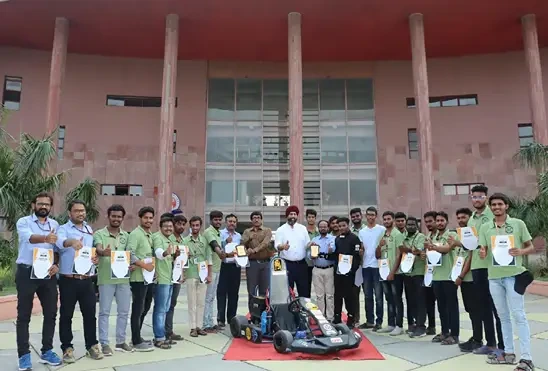
Participated in Drawing Competition on Engineers day.

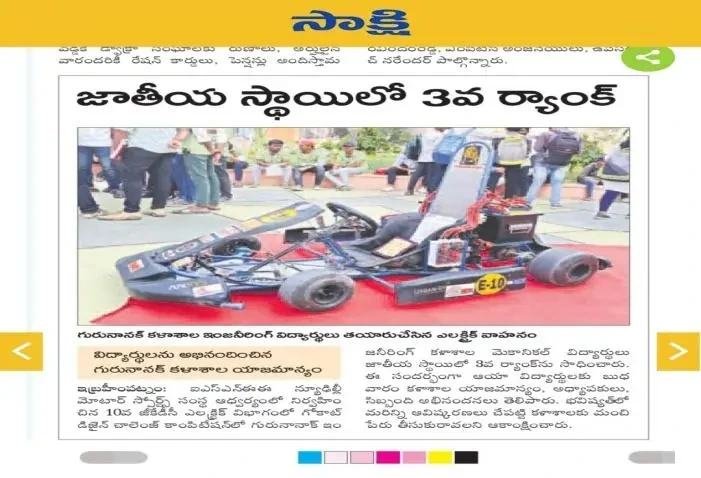

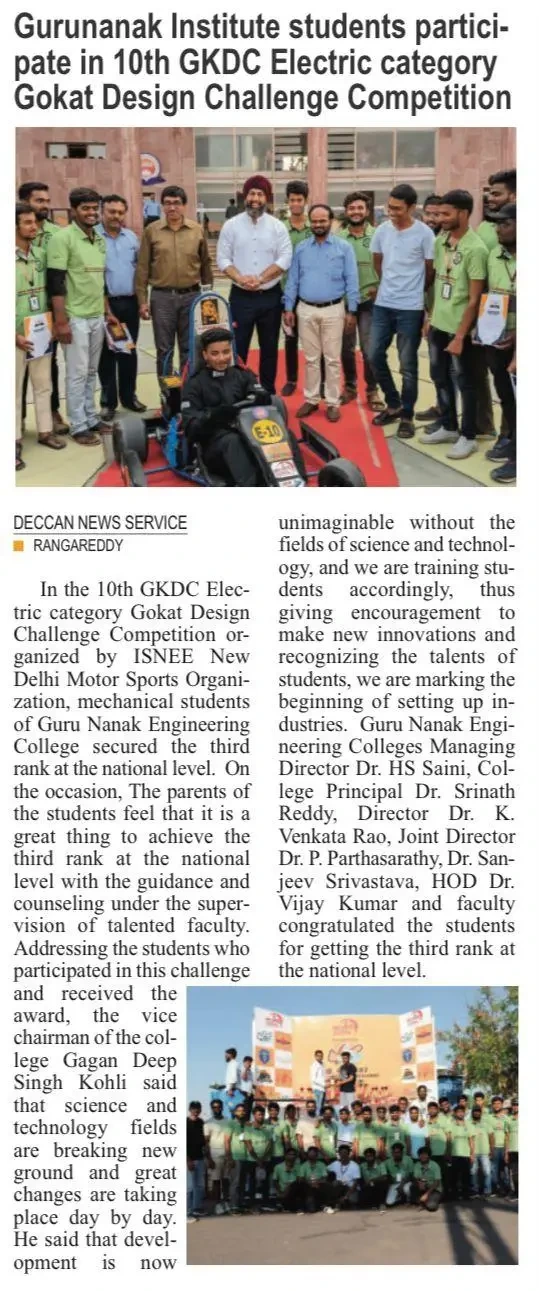
Annual Day 2023 Prize Distribution
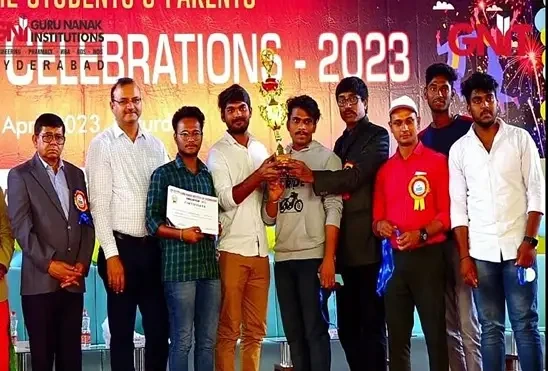

Participated in Khelotsav 2k22 Kabaddi
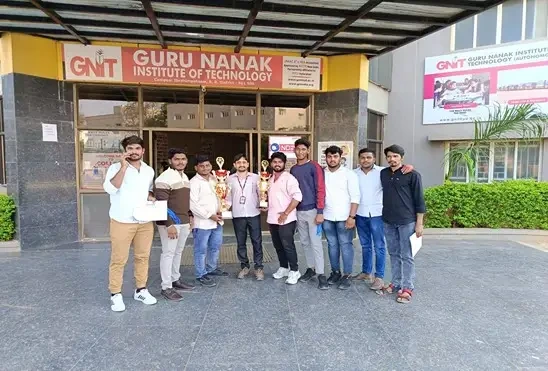
Participated in Khelotsav 2k22 WallyBall
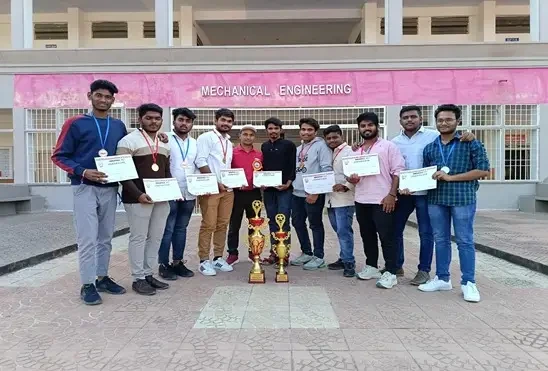
Prize Distribution on Annual Day

Project Exhibition on Robotics

Presentation on Manufacturing Methods in 21st century
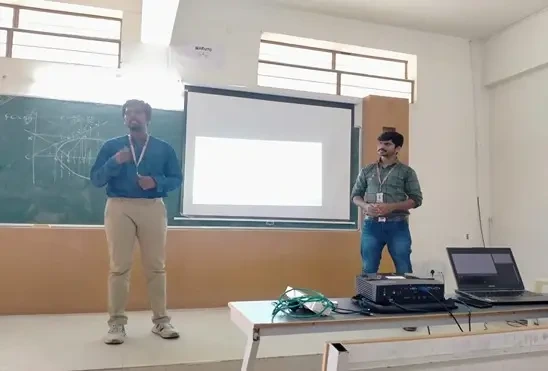
Drawing Competition under Department Association
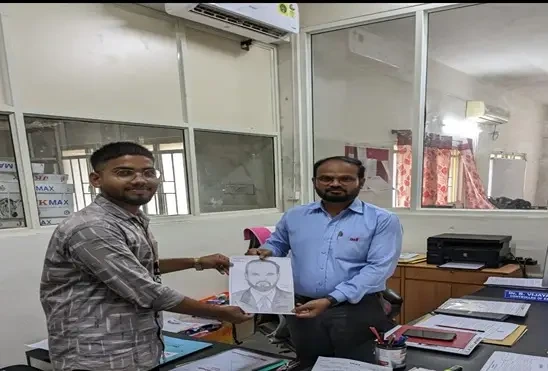
Robot Competition

Exposure to work on the Gokart eV chassis

Singing Competition on the occasion of Telangana state Dashabdi Ustavalu.

Department Startups:


Departmental Clubs
Department of Mechanical Engineering Centre of Excellences
The Center of Excellences (CoE) drives industry collaboration through specialized training, research, and best practices to address emerging workforce needs. The mechanical department includes four CoEs: Automotive, Product Design and Development, Advanced Materials and Metal Joining, and Design and Additive Manufacturing. Each CoE bridges skill gaps, fosters innovation, and equips the workforce with the expertise required for future industry demands. From a student's perspective, these CoEs provide hands-on experience, exposure to cutting-edge technologies, and a deeper understanding of industry trends, enhancing their knowledge and employability.
Centre of Excellence Automotive

Figure 1: Fostering Innovation: Group Photo with Dr. H. S. Saini and Prof. Anil Sahasrabudhe in the Automotive Centre
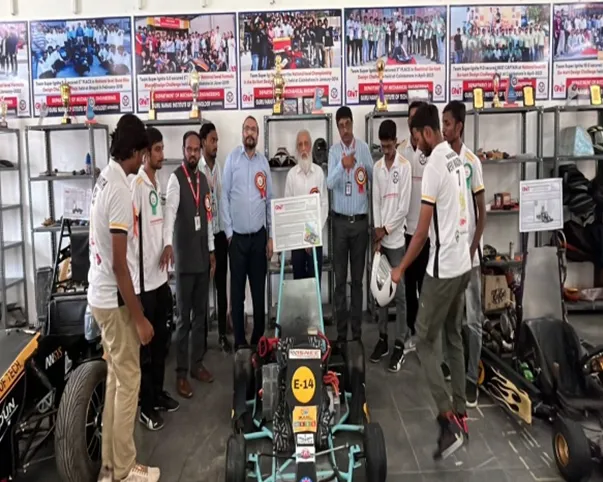
Figure 2: Students Discussing GO-KART EV Ideas with Dr. H. S. Saini and Prof. Anil Sahasrabudhe
Centre for Product Design and Development
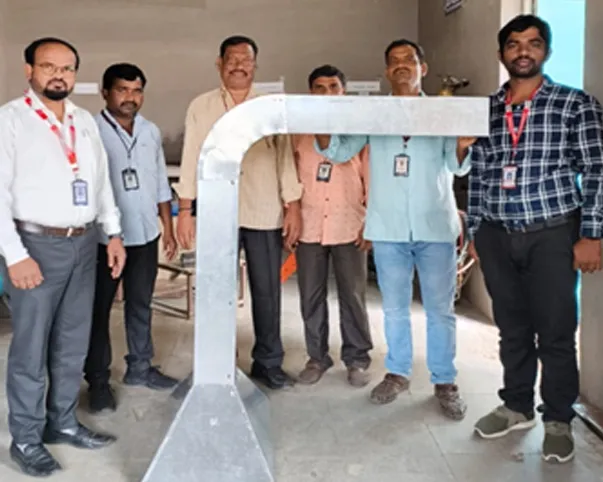
Figure 3: Fabrication of Modular Kitchen Chimney
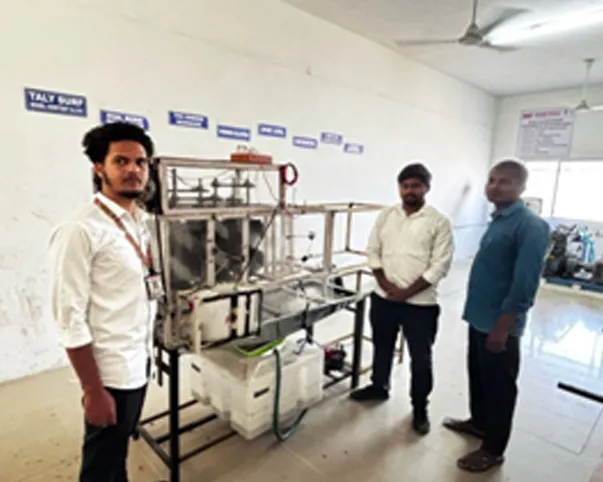
Figure 4: Dish Washer Machine
Centre for Design and Additive Manufacturing& Advanced Materials and Metal Joining
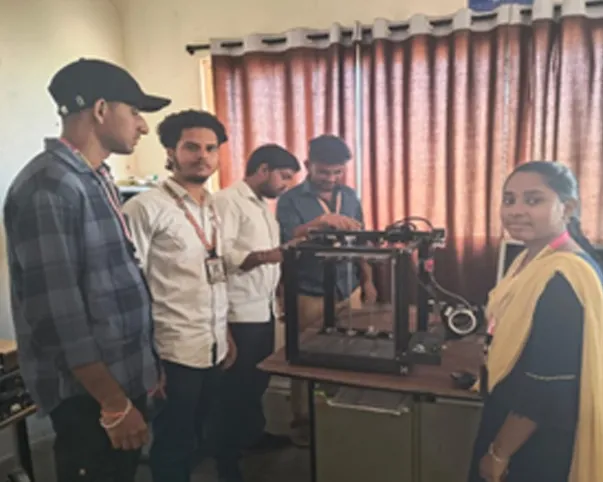
Figure 4: Additive Manufacturing Using 3D Printer.
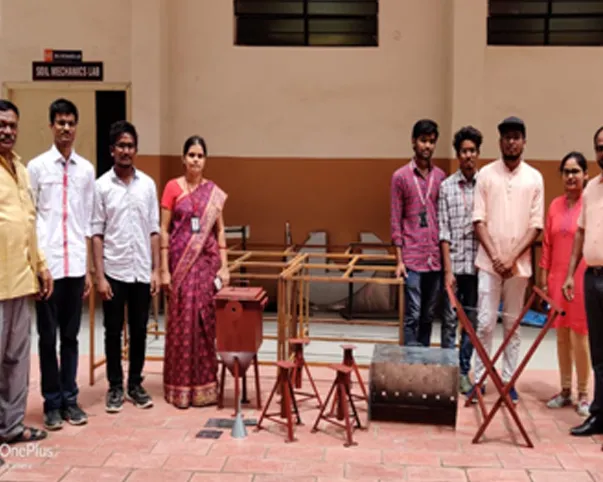
Figure 5 : Joining of components Through Welding.
Departmental Events
Workshop
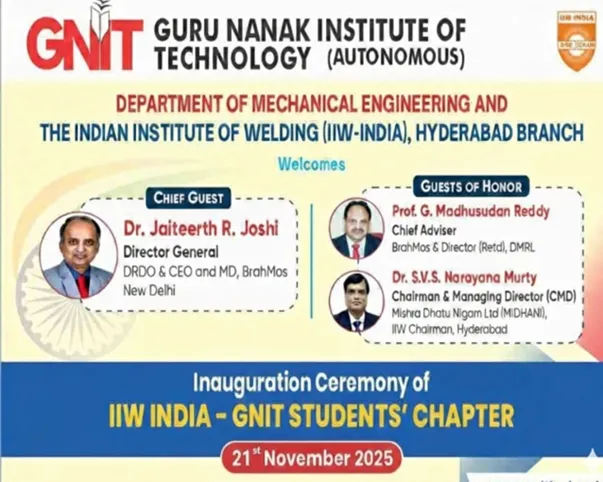
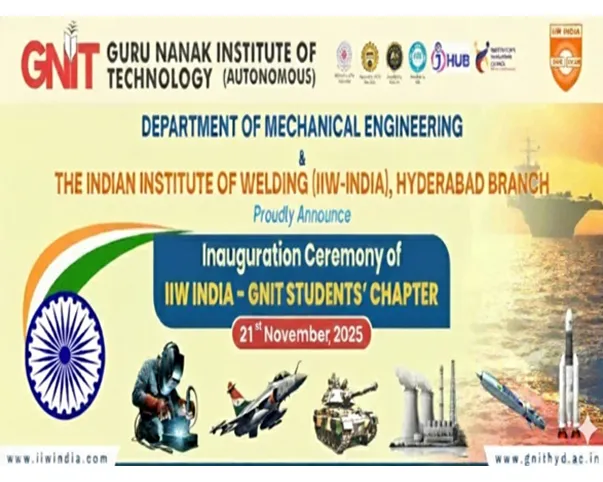
The Department of Mechanical Engineering, Guru Nanak Institute of Technology (Autonomous), in association with the Indian Institute of Welding (IIW–India), Hyderabad Branch, proudly organized the Inauguration Ceremony of the IIW India – GNIT Students’ Chapter on 21st November 2025.
The event marked a significant milestone in strengthening industry–academia collaboration and promoting technical excellence in the field of welding and manufacturing technologies. The ceremony was graced by eminent dignitaries from premier national organizations, who shared their insights and encouraged students to engage in professional development, research, and innovation.
The establishment of the IIW India – GNIT Students’ Chapter aims to provide students with exposure to industry practices, professional networking opportunities, technical workshops, and skill development programs, thereby enhancing their employability and technical competence.
The event was graced by distinguished guests:
* Dr. Jaiteerth R. Joshi – Director General, DRDO & CEO–MD, BrahMos
* Dr. S.V.S. Narayana Murty – CMD, MIDHANI & Chairman, IIW Hyderabad
* Prof. G. Madhusudhan Reddy – Chief Advisor, BrahMos & Former Director, DMRL
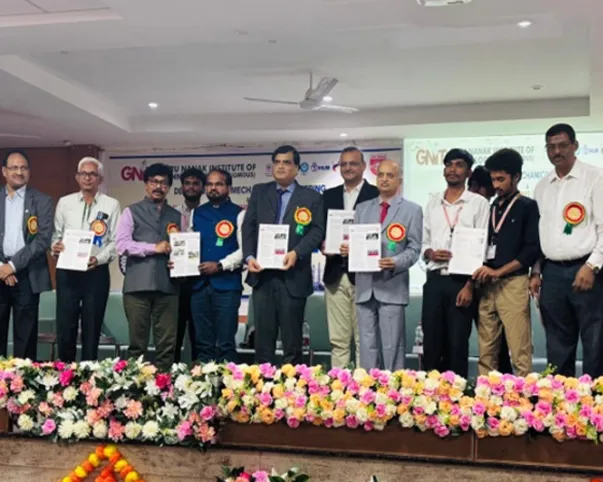
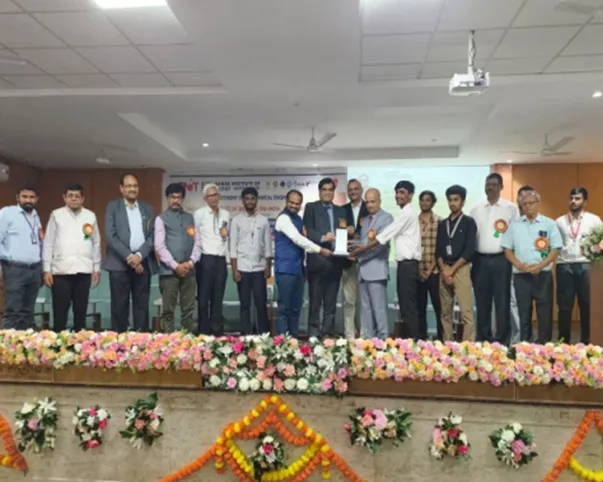
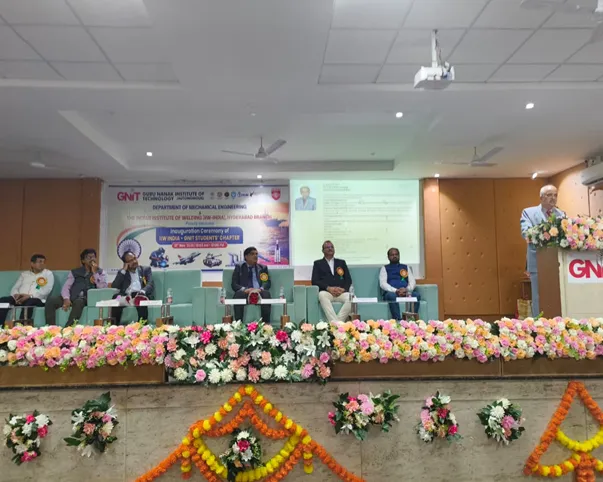
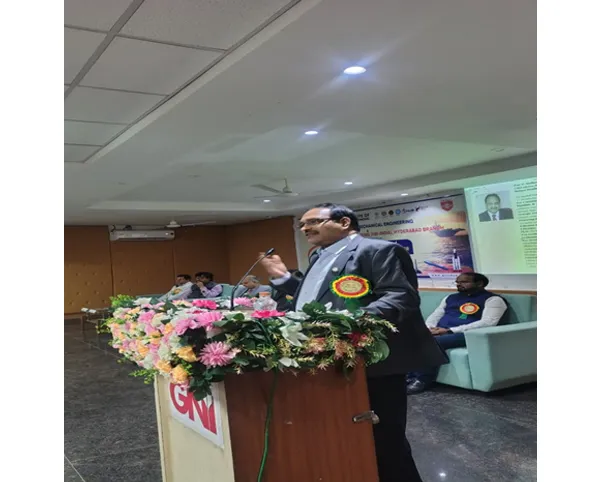
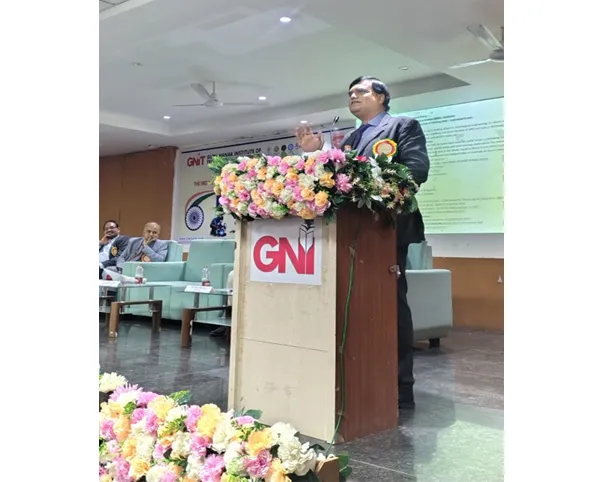
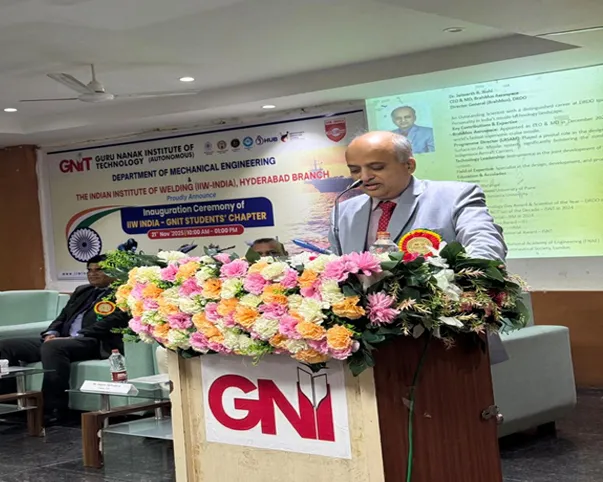



The Department of Mechanical Engineering at GNIT proudly hosted a Workshop on 3d printing from concept to creation. This workshop offers hands-on experience in 3D printing, guiding participants from initial concept design to final prototype creation. Gain practical skills and knowledge for transforming ideas into tangible objects.

The Department of Mechanical Engineering at GNIT proudly hosted a workshop on shaping the future with fusion 360. This workshop equips participants with the skills to design and prototype using Fusion 360, enhancing creativity and innovation. Master CAD tools to shape and refine ideas for real-world applications.


TECHNICAL QUIZ



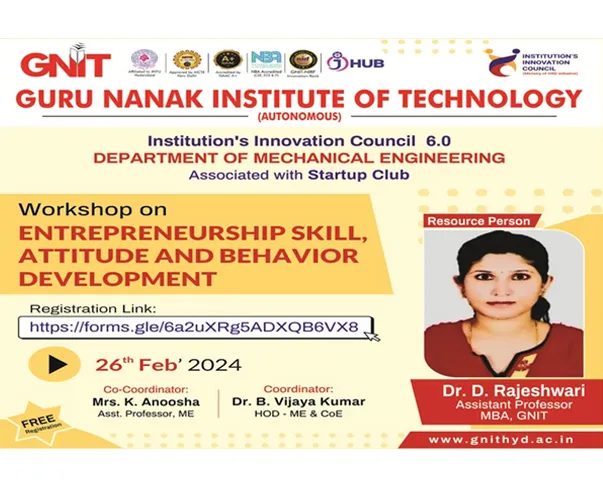
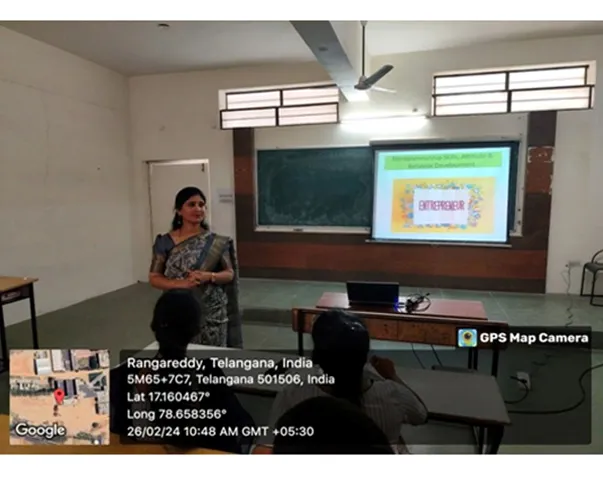
The Department of Mechanical Engineering at GNIT proudly hosted a transformative workshop on 'Entrepreneurship Skill, Attitude, and Behavior Development,' inspiring young minds to embrace innovation and leadership.
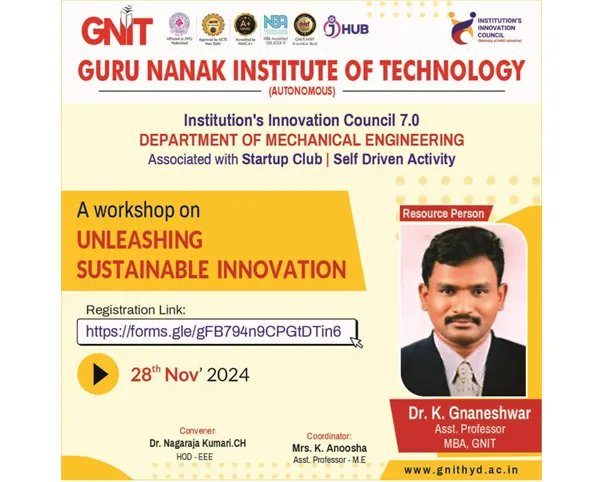
Empowering innovation for a sustainable future! The Department of Mechanical Engineering at GNIT proudly hosted the workshop on 'Unleashing Sustainable Innovation,' inspiring minds to create groundbreaking solutions
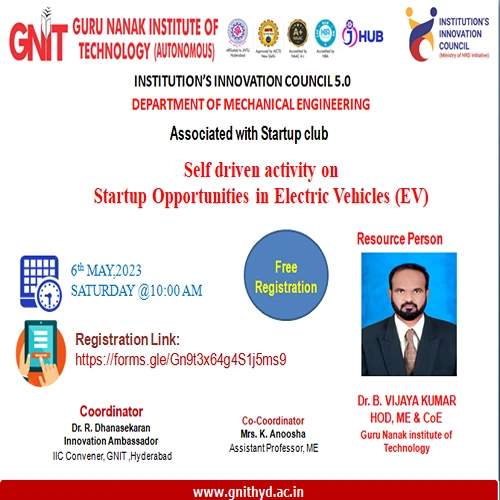
Self driven activity on Startup Opportunities in Electric Vehicles (EV) by Dr B. Vijaya Kumar HOD & COE GNIT

Hands on practice workshop on CNC Machines
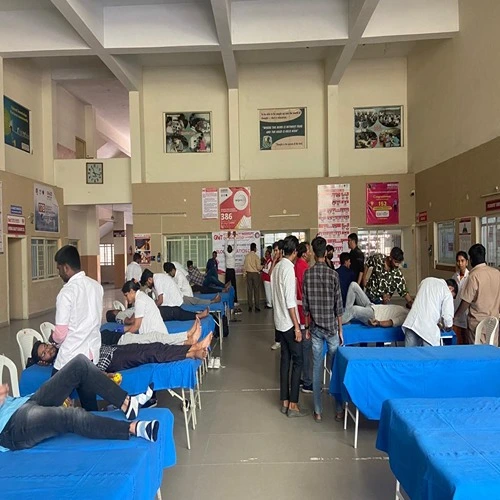
Blood Donation Camp
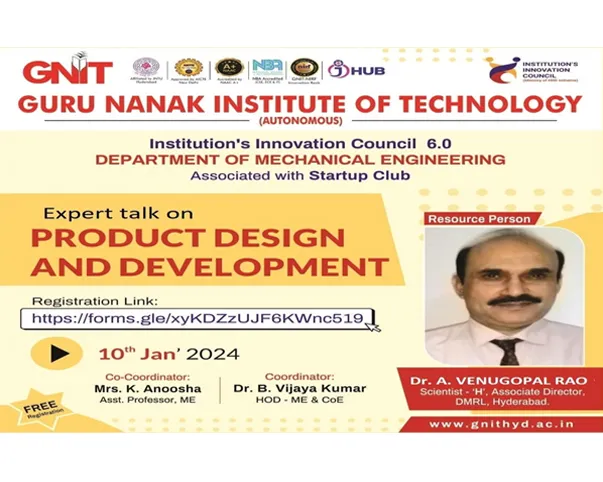
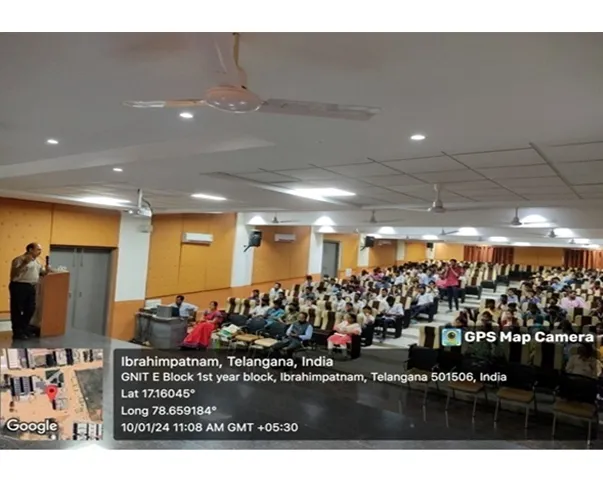
The Department of Mechanical Engineering at GNIT proudly organized a keynote session on 'National Startup Day,' inspiring young innovators with insights from industry experts.
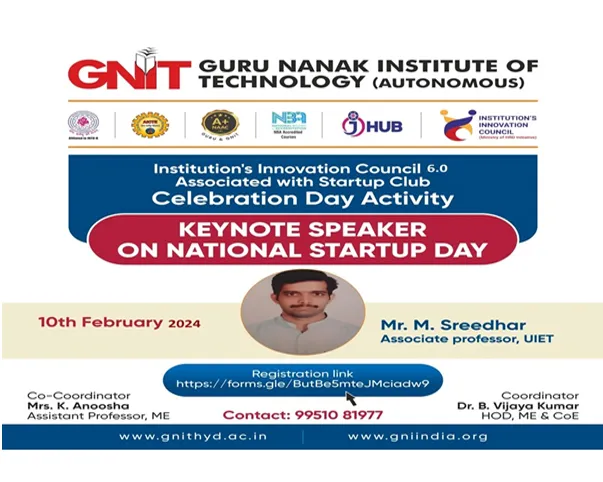
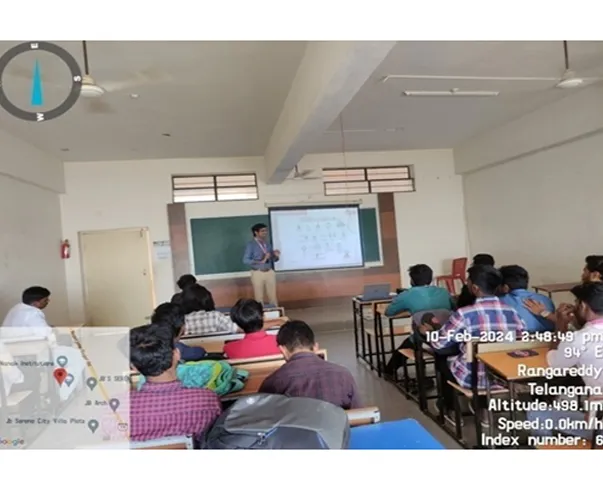
Dr. B. Vijaya Kumar, Controller of Examinations and HOD - Mechanical Engineering, GNIT, delivered an insightful seminar on 'Intellectual Property Rights,' empowering students with knowledge on innovation and legal protection.
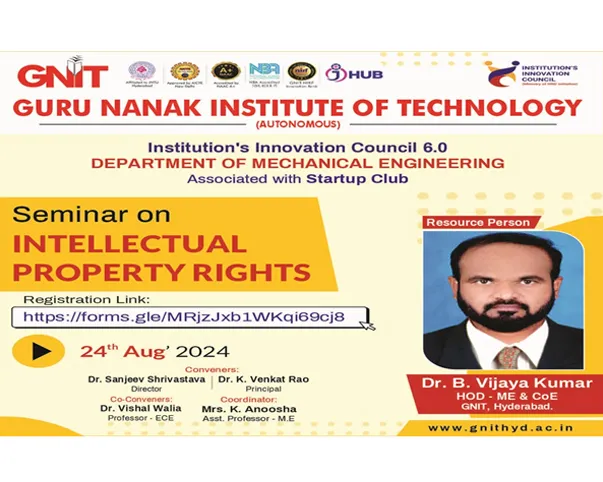
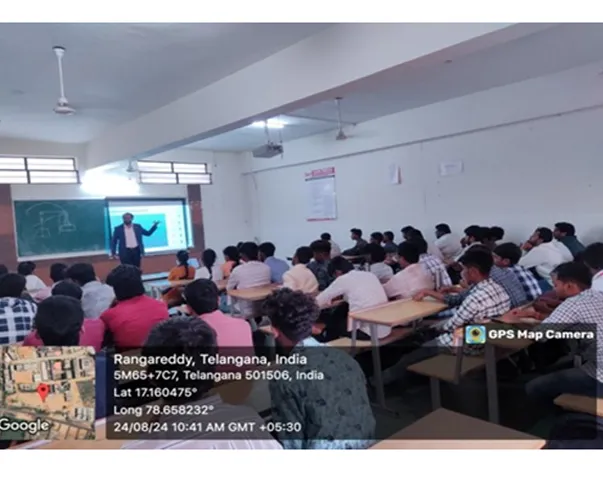
The Department of Mechanical Engineering at GNIT organizes impactful seminars, fostering innovation, entrepreneurship, and technical excellence among students.
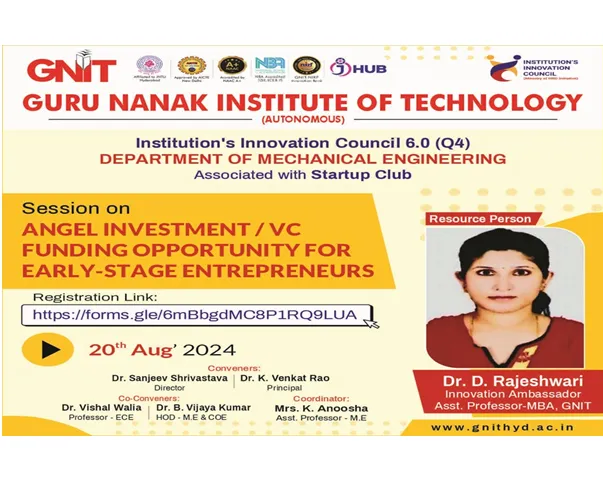
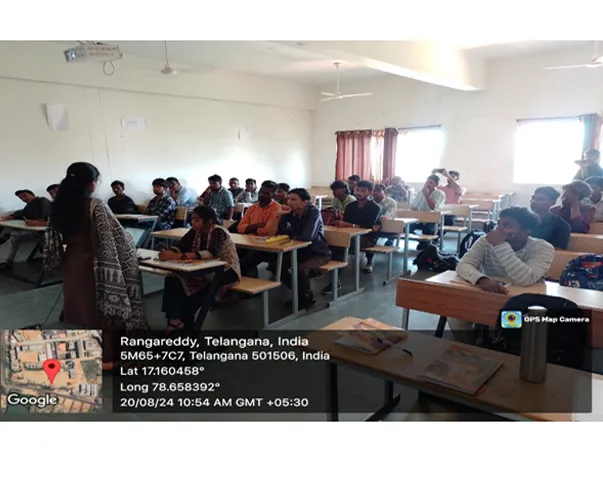
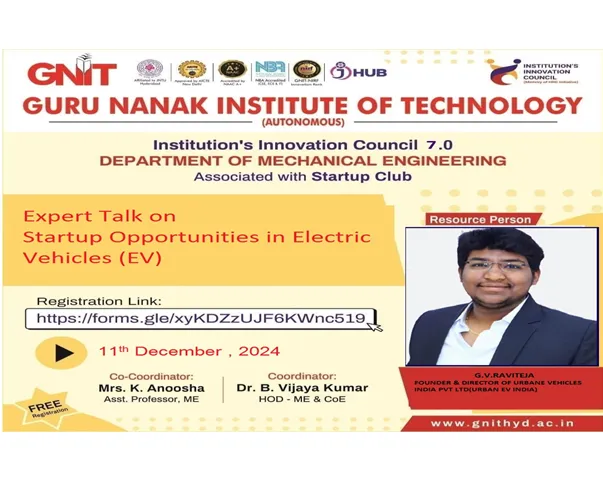
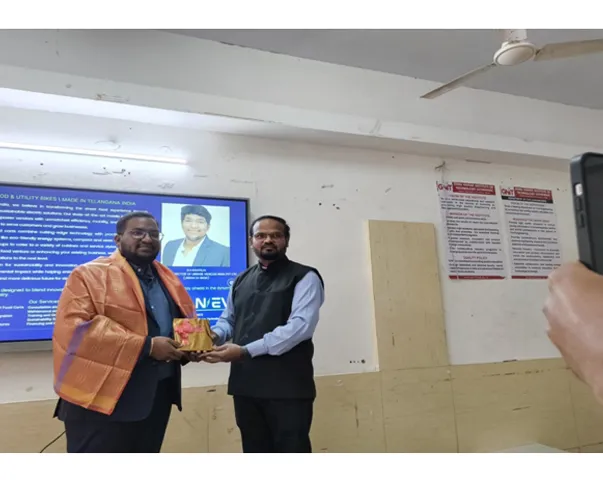
The Department of Mechanical Engineering at GNIT organizes impactful seminars, fostering innovation, entrepreneurship, and technical excellence among students.
Coming Soon...
Coming Soon...
II Year Students are visited to Mansarowar Ispat India Pvt. Ltd., Kottur Industrial Area, Hyderabad, on March 8, 2025.



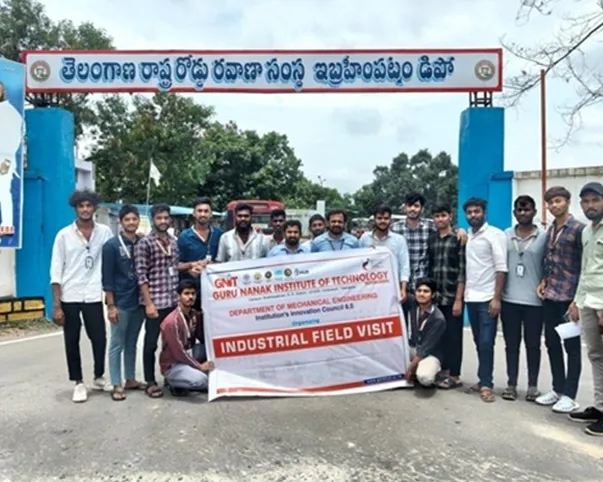
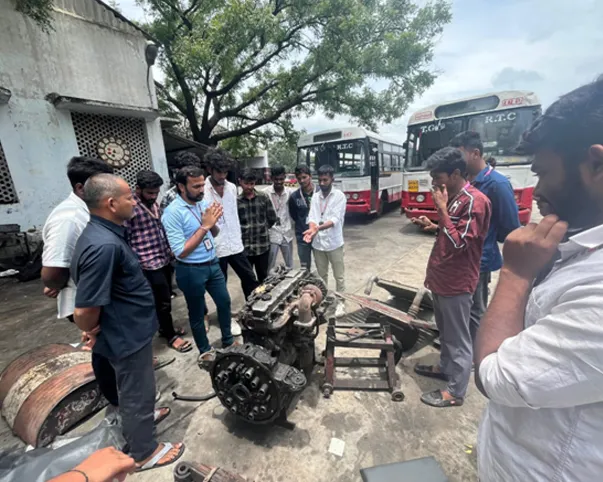
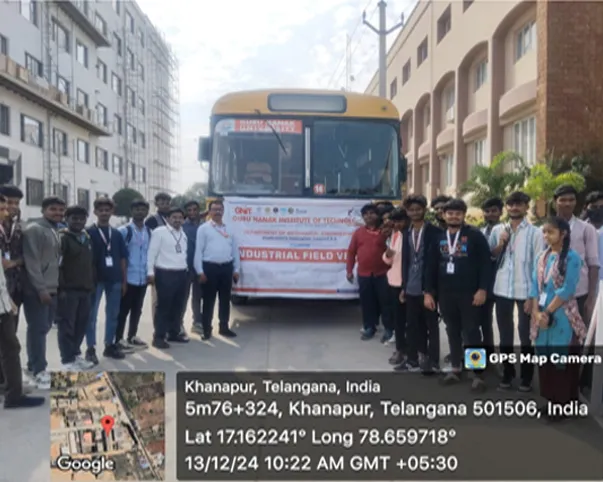

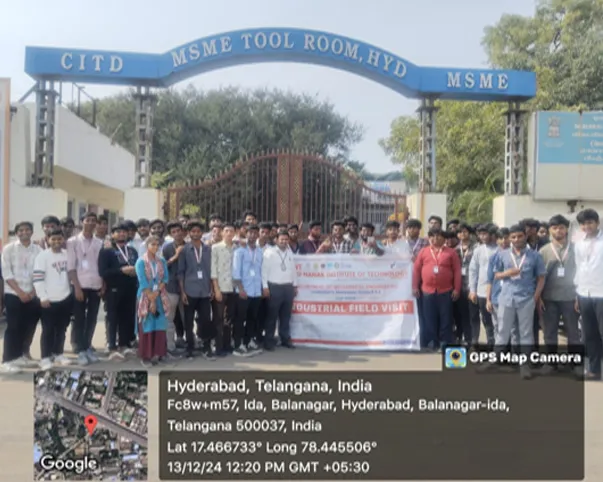
Mechanical Engineering students of GNIT successfully participated in an Industrial Field Visit to RTC Depot, gaining hands-on experience in engine, chassis servicing, and maintenance techniques.
Expanding design expertise, our Mechanical Engineering students from GNIT gained hands-on insights into innovative design processes during an enriching visit to the Central Institute of Tool Design, Hyderabad.
Industry Visits
TARGET EQUIPMENTS AND MACHINES PVT LTD

On 6th may, 2023 We reached at Target Equipments And Machines Pvt Ltd is a machinery company based out of Plot No. 9, Road No.1, IDA, Mallapur, Hyderabad, Telangana, India by 9:30 AM. We got the entry at 9:45 AM. Manufacturing of Boiler Supporting structures, Turbine Parts, Material Handling Equipments crushers, products for oil spills, storage tanks, pressure vessels, heavy fabrication & machining components to cement industries and power plant.
Ibrahimpatnam TSRTC Bus Depot Workshop
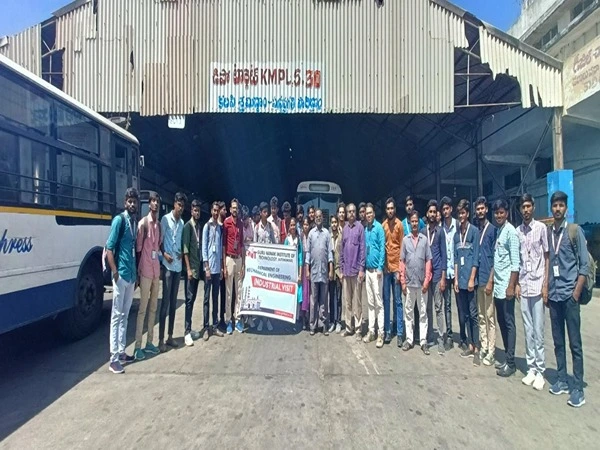
On 17th August, 2023 We reached at Telangana State Road Transport Corporation (Ibrahimpatnam) by 9:30 AM. We got the entry at 9:45 AM. There are various departments in the Bus Depo workshop. We have seen the various departments like BS-6 Engine repair section, Gear box repair section, Hub greasing section. Internal expand braking system repair, Tyre section, repairing the leaf springs.
Guest Lectures
EXPERT TALK

The Department of Mechanical Engineering at Guru Nanak Institute of Technology (Autonomous) is organizing an Expert Talk on "Design and Manufacturing of a Quad Torque Vehicle for Ghat Roads: Challenges and Solutions”. The expert talk will be delivered by Mr. Umesh Kumar, Founder & Director of ISNEE Motorsports Private Limited, who brings extensive experience and expertise in the field of automotive design and motorsports.

The Department of Mechanical Engineering at GNIT, in collaboration with Institution's Innovation Council 7.0 and the Startup Club, is hosting an expert talk on Startup Opportunities in Electric Vehicles (EV). The session will be delivered by Mr. G.V. Raviteja, Founder & Director of UrbnEV Vehicles. This event aims to inspire budding entrepreneurs to explore the rapidly growing EV industry and its startup potential.
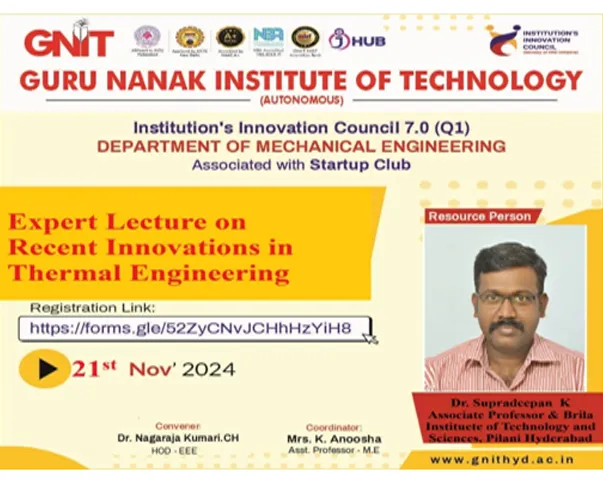
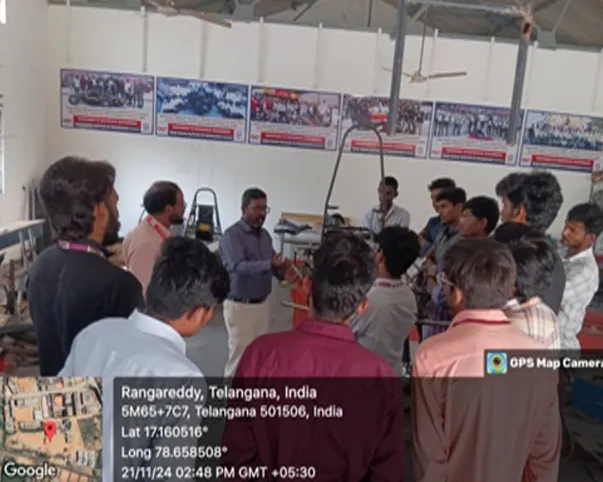
Unlocking the future of engineering! The Department of Mechanical Engineering at GNIT hosted an inspiring expert Guest lecture on 'Recent Innovations in Thermal Engineering,' empowering students with groundbreaking insights and industry expertise.
Guest Lecture on Mechanics of solids
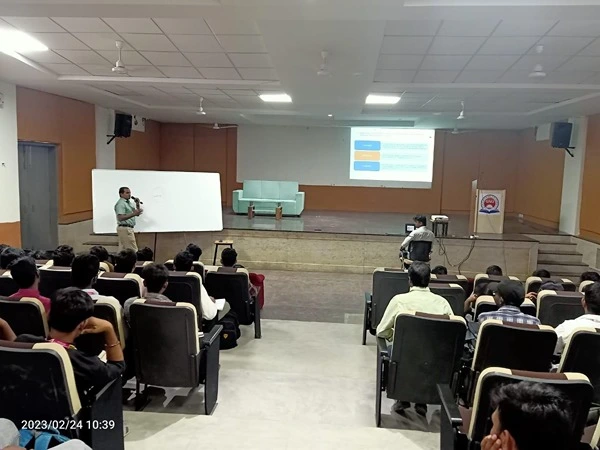
Speaker: Dr. S. Solomon Raja
Professor, Department of Mechanical Engineering.
CBIT.
Guest Lecture on THERMODYNAMICS

Speaker: Dr. G. Srinivasa Sharma
Assoc. Professor, DEPARTMENT OF MECHANICAL ENGINEERING.
MVSR Engineering College.

